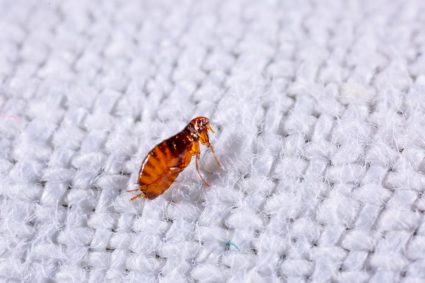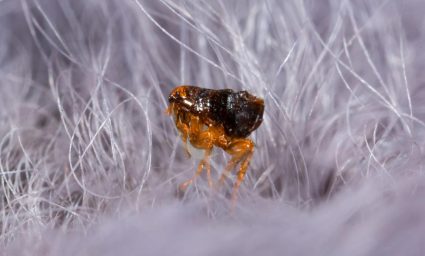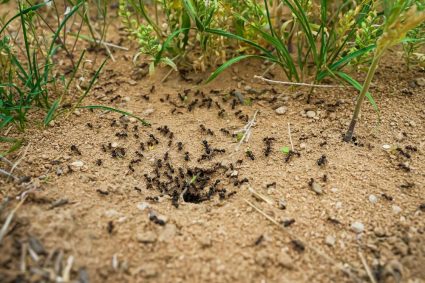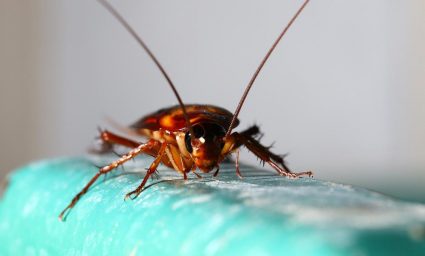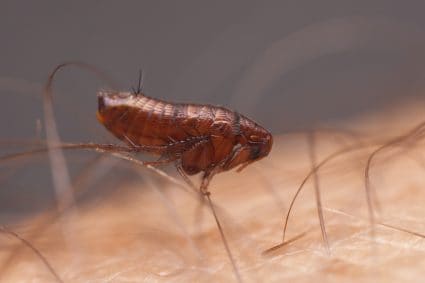
Ants can be both a friend and a foe in your garden. While they can contribute to soil aeration and pest control, they can also damage plants and encourage other pests. If you’ve noticed an influx of ants around your plants and want to keep them at bay naturally, this comprehensive guide is for you.
To naturally keep ants away from plants, you can plant ant-repellent plants like mint, rosemary, and lavender around your garden. Other methods include spraying a vinegar solution or essential oils like peppermint and cedarwood around the plants, sprinkling used coffee grounds or diatomaceous earth in the soil, or using a borax and sugar mixture near ant nests. Altering the environment around the plants to make it less appealing to ants can also be effective.
Understanding Ants and Their Interaction with Plants
Before we delve into the solutions, it’s crucial to understand the relationship between ants and plants. Ants can play a beneficial role in your garden. They help aerate the soil, aid in pollination, and control other pests. However, when their populations become too large or they protect harmful pests, they can negatively impact plant health.
Among the most common types of ants that harm plants are fire ants, carpenter ants, field ants, Argentine ants, pavement ants, sugar ants, and other common pest species. These ants can damage plant structures, encourage sap-sucking pests, and disrupt the plant’s overall health.
The Natural Methods to Deter Ants
There are several natural methods to deter ants from infesting plants. Some of these methods are:
Planting Ant-Repellent Plants
Plants like mint, rosemary, lavender, garlic, basil, and chrysanthemum are known to repel ants. Planting these around your garden can help keep ants away from your plants.
Vinegar Solution
A 50/50 vinegar to water solution sprayed on the soil can deter ants due to its strong smell.
Coffee Grounds and Cinnamon
Sprinkling used coffee grounds in the soil or cinnamon around the base of your plants can help repel ants.
Essential Oils
Essential oils, such as peppermint, cedarwood, and cinnamon, are known to repel ants. You can mix a few drops of these oils with water and spray it around your plants.
Diatomaceous Earth
Sprinkle diatomaceous earth around your plants to deter ants, as it can damage their exoskeletons.
Borax or Boric Acid
Mix borax or boric acid with sugar and place it near ant nests to help control ant populations.
Altering the Environment Around the Plants
To make the environment around plants less appealing to ants, you can:
- Grow ant-repellent plants.
- Use natural repellents like diatomaceous earth or citrus peels.
- Remove aphids and mealybugs, which attract ants.
- Create barriers by drawing a line with chalk or sprinkling crushed eggshells around plants.
- Apply a soap solution or vinegar spray to the plants and surrounding area.
The Benefits of Using Natural Methods
Using natural methods to deter ants has several benefits. They are safer for humans, pets, and the environment. They are cost-effective, sustainable, and offer a more targeted approach. Furthermore, natural methods provide long-term control by addressing the root cause of the ant infestation.
Identifying Ant Infestation
Look for signs like the presence of ants, trails of ants, aphids, scales, or mealybugs, soil disturbance, and damaged plant roots. If you suspect an infestation, take a photo of the ant and email it to your local university extension office for identification.
The Long-Term Effects of Ant Infestation
Ant infestations can have both positive and negative long-term effects. The negative effects include encouraging sap-sucking pests, disturbing plant roots, and soil deposition. On the other hand, ants can improve soil fertility, aid in seed dispersal, control pests, and contribute to pollination.
Using Essential Oils to Repel Ants
To use essential oils to repel ants from plants, create a natural ant repellent spray. In a clean spray bottle, mix 10-15 drops of your chosen essential oil (or a combination of oils) with 1 cup of water. Add a few drops of dish soap to help the oil mix with the water. Spray the mixture on the plants and surrounding areas where you’ve noticed ant activity.
Remember, ants can be beneficial to your garden. It’s essential to strike a balance between controlling ant populations and maintaining a healthy garden ecosystem. By using these natural methods, you can keep ants away from your plants effectively and safely.
Frequently Asked Questions
What other plants can repel ants?
Other plants that can repel ants include tansy, wormwood, and rue. Their strong scent deters ants and other pests.
How often should I spray the vinegar solution?
You should spray the vinegar solution once every two weeks or more frequently if there’s a heavy ant infestation. Always check the plant’s condition before spraying as some plants may not tolerate the acidity of vinegar.
Can I use fresh coffee grounds instead of used ones?
Yes, you can use fresh coffee grounds. However, used coffee grounds are preferred as they have less acidity that can potentially harm plants.
How safe is diatomaceous earth for pets and children?
Food-grade diatomaceous earth is generally safe for pets and children. However, it should be used cautiously as inhaling it can irritate the lungs.
Can I use any type of essential oil to repel ants?
Not all essential oils repel ants. The most effective ones include peppermint, cedarwood, and cinnamon. Lemongrass, tea tree, and citrus oils can also be effective.
How often do I need to apply the essential oil mixture?
You should apply the essential oil mixture once a week. If it rains, you may need to apply it more frequently as rain can wash away the mixture.
Will borax or boric acid harm my plants?
Borax and boric acid can potentially harm your plants if used excessively. It’s best to place the mixture near ant nests and away from plant roots.

